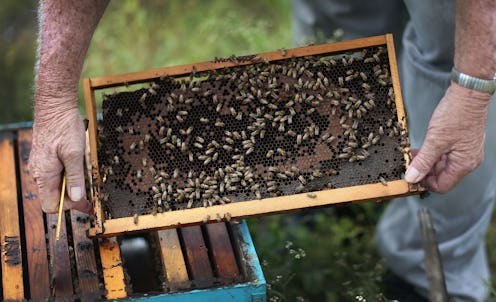Life
A Woman Reportedly Died After Receiving 'Bee Acupuncture'

A woman in Spain died recently after undergoing an alternative acupuncture therapy that uses live bee stings instead of the usual needles, according to The Washington Post. While she was reported to have responded well to previous treatments, the woman suddenly suffered a severe allergic reaction to the venom therapy—falling into a coma which ultimately led to her death.
According to the American Apitherapy Society (AAS), bee acupuncture is a form of apitherapy, or an alternative therapy that uses bee products to manage pain, and treat various health conditions. Apitherapy treatments have been around for thousands of years. The National Center for Biotechnology Information (NCBI) states in one report that bee venom treatments were used in ancient Greece, Rome, and Egypt, and are also reported in the histories of Asia. Practitioners use bee venom and other bee substances, such as honey, pollen, beeswax, and royal jelly, to treat a variety of conditions like arthritis and chronic pain conditions. Live bee acupuncture is also sometimes prescribed by apitherapy proponents, in which practitioners pinch the insect’s head until the sting emerges, resulting in the transfer of venom (and the bee’s death). In some cases the venom is delivered through injection with needles. The AAS doesn’t claim to cure any specific conditions, but recommends apitherapy for a number of illnesses like multiple sclerosis (MS), shingles, gout, and the treatment of tumors. Practitioners include doctors, nurses, acupuncturists, and naturopathic physicians, according to the AAS. The AAS also states that some beekeepers practice apitherapy, and provide people with bees and instructions for self-treatment. Apitherapy is not considered a legitimate medical treatment in the United States, and is considered an alternative and experimental method only.
The unnamed 55-year-old native of Spain had been receiving apitherapy treatments, particularly bee venom treatments, about once a month for two years, for the management of stress and muscle stiffness. According to Paula Vazquez-Revuelta and Ricardo Madrigal-Burgaleta of The Journal of Investigational Allergology and Clinical Immunology, the woman had no history of health problems like asthma or heart disease, allergies, or reactions to insect bites or stings. The report also states that “Previous tolerance to bee stings does not prevent hypersensitivity reaction; however, repeated exposure favors a higher risk of sensitization.” Despite a number of previous treatments with no ill effects, the woman suddenly “developed wheezing, dyspnea, and a sudden loss of consciousness immediately after a live bee sting,” and fell into a coma. Despite efforts by doctors to save her life with antihistamine and adrenaline treatments, the woman died from multiple organ failure after several weeks in the hospital. According to the journal, this is the first reported death from bee venom therapy in a patient who was previously tolerant of the treatments.
Tom Embury-Dennis of The Independent reports that bee venom treatments are especially popular in China and Korea. While supporters of apitherapy claim the therapies help manage a slew of medical and chronic pain conditions, including pain from acute injuries, not much is published in medical journals showing the efficacy of the controversial treatments. Anecdotal reports suggest apitherapy may be effective in treating autoimmune, gastrointestinal, infectious, cardiovascular, and neuropathic pain conditions, and practitioners are urged by the AAS to test for bee sensitivities before embarking on a treatment plan.
But a 2015 report by the National Center for Biotechnology Information reviewed 145 studies involving bee venom, and found that about 29 percent of patients experienced adverse reactions ranging from minor skin irritations, to potentially life-threatening anaphylactic shock. While limited research does suggest that bee venom therapies are effective for treating pain and inflammation associated with both osteoarthritis and rheumatoid arthritis, concerns about potential side effects and reactions to the treatments continue. The authors of the investigative report into the woman’s death state that “adverse events related to bee venom therapy are frequent,” warning practitioners to proceed with caution, and advising potential patients to avoid bee venom treatments entirely as potential risks may exceed the benefits.